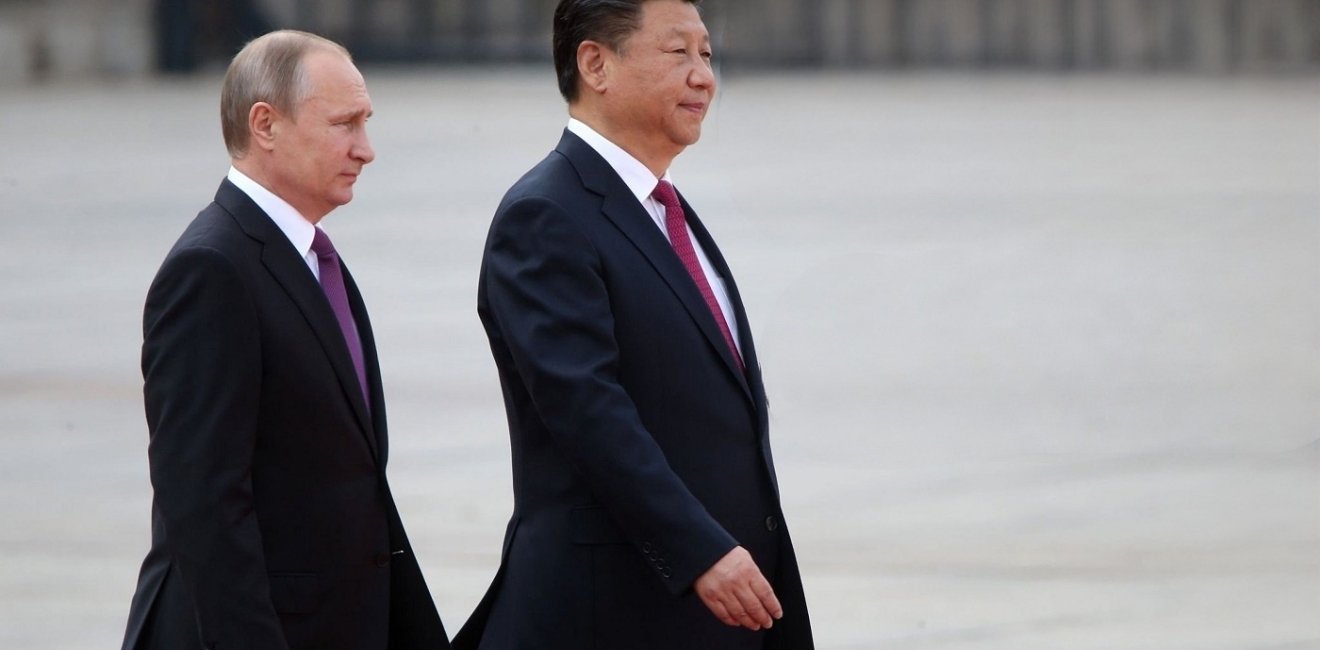
A blog of the Kennan Institute
At a recent meeting in Beijing, Presidents Xi Jinping and Vladimir Putin called each other “old” and “dear” friends, reprising the “no-limits” friendship they declared in 2022. The earlier declaration came shortly before Russia invaded Ukraine and seemed to signal that Xi would not join the worldwide condemnation of Putin’s aggression. It now appears to be a recurrent theme.
All along, however, there have been indications that there are limits to this friendship, at least for Xi. In 2022, he gently rebuked Putin over the latter’s nuclear saber-rattling and declined to give significant military support to Russia. And a few months after the no-limits comment, China’s ambassador to the EU said it was “nothing but rhetoric.” But the relationship between Xi and Putin seems to be largely intact.
Forces behind the Friendship
What holds this bromance together? Trade and other economic interests are involved, to be sure, but an equally important force behind it is a set of shared grievances toward America and its allies. From the perspective of Xi and Putin, the West is not only unbearably arrogant, it is intent on maintaining a global order that would hold China down and punish or even destroy Russia.
These grievances may provide glue for this relationship in the short run, but it is a relationship based on the bogus assumption that the two countries are equal partners, something that will lead to tensions in the longer term.
In reality, China dwarfs Russia in material terms, with ten times the GDP and ten times the population, and it outdistances Russia in technological innovation and just about every other sector as well. These facts are a source of unease to the Kremlin, which during Soviet times had grown accustomed to viewing itself as the “big brother” who provided advice, aid, and security to China.
Russia’s Heroic Self-Image as Preserver of Traditional Values
In an attempt to redress these imbalances in the relationship, Russia often turns to alternative ways to shore up its status. In particular, it draws on a national narrative about the spiritual strength that made it possible for Russia to save the world from fascism and lead today’s global effort to preserve traditional values. In this account, Russia is the leading defender of genuine Christianity and traditional values against a corrupt, degenerate West.
After seven decades of Soviet atheism, this may come as a surprise to many, but the historical roots of this view extend back far before Marxism-Leninism. In the fifteenth century, for example, Russian religious figures declared Moscow the “Third Rome,” a bulwark against the corruption and degeneracy that led to the downfall of Rome and then Constantinople as the seat of Christianity.
Russian thinkers have long touted these claims, which early in the twentieth century took on new life in discussions of “Eurasianism.” The Russian linguist and historian Nikolai Trubetskoy (1890–1938), for example, outlined a version of Eurasianism that traced Russia’s origins to the Mongolian invasions of the thirteenth century, which produced a powerful hybrid of Mongol governance and Orthodox beliefs and a unique civilization that is distinct from Europe’s.
In this view, Russia became a homeland for people endowed with unique spiritual values, such as a commitment to hierarchical order and a desire for a strong leadership needed in its perpetual struggle with “Romano-Germanic” civilization, the precursor to what Putin now calls the “collective West.”
Putin has added a further ominous note to the debate by resurrecting the ideas of the Russian philosopher and Christian fascist Ivan Ilyin (1893–1954), whom he frequently quotes and whose works he has recommended to Russian officials. Ilyin expressed contempt for such Western values as individualism and equality and viewed them as existential threats that could infiltrate, corrupt, and eventually destroy Russia, requiring constant vigilance and an aggressive response.
Threats to the Friendship as Russia Fights “Junior Partner” Status
The threat this line of reasoning poses to the no-limits friendship between Russia and China stems from the assumption that Russia has led the way in prevailing over the aggression and corrupting influence of the West and hence is entitled to be the true leader of all nations trying to resist it. China has historical grievances of its own, of course, but Putin’s rhetoric assumes that Russia is in the vanguard of the struggle.
As Russia slips further into the role of a junior partner of China in material terms, its heroic, messianic narrative will play an increasingly important role as it calls for respect and power. The danger for the Kremlin is that it will overplay this self-image of global leadership and appear defensive and arrogant in the eyes of Beijing—which in the end is a poor foundation for a no-limits relationship.
The opinions expressed in this article are those solely of the author and do not reflect the views of the Kennan Institute.
Author


Kennan Institute
After more than 50 years as a vital part of the Wilson Center legacy, the Kennan Institute has become an independent think tank. You can find the current website for the Kennan Institute at kennaninstitute.org. Please look for future announcements about partnership activities between the Wilson Center and the Kennan Institute at Wilson Center Press Room. The Wilson Center is proud of its historic connection to the Kennan Institute and looks forward to supporting its activities as an independent center of knowledge. The Kennan Institute is committed to improving American understanding of Russia, Ukraine, Central Asia, the South Caucasus, and the surrounding region through research and exchange. Read more

Explore More in The Russia File
Browse The Russia File
Chechnya as a Model of Modern Russia

Russia’s Indigenous Communities and the War in Ukraine

Gas and Power in a Changing US–Russia Relationship

